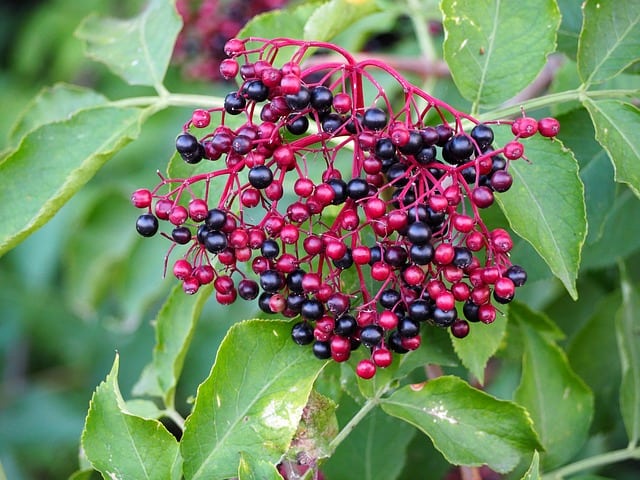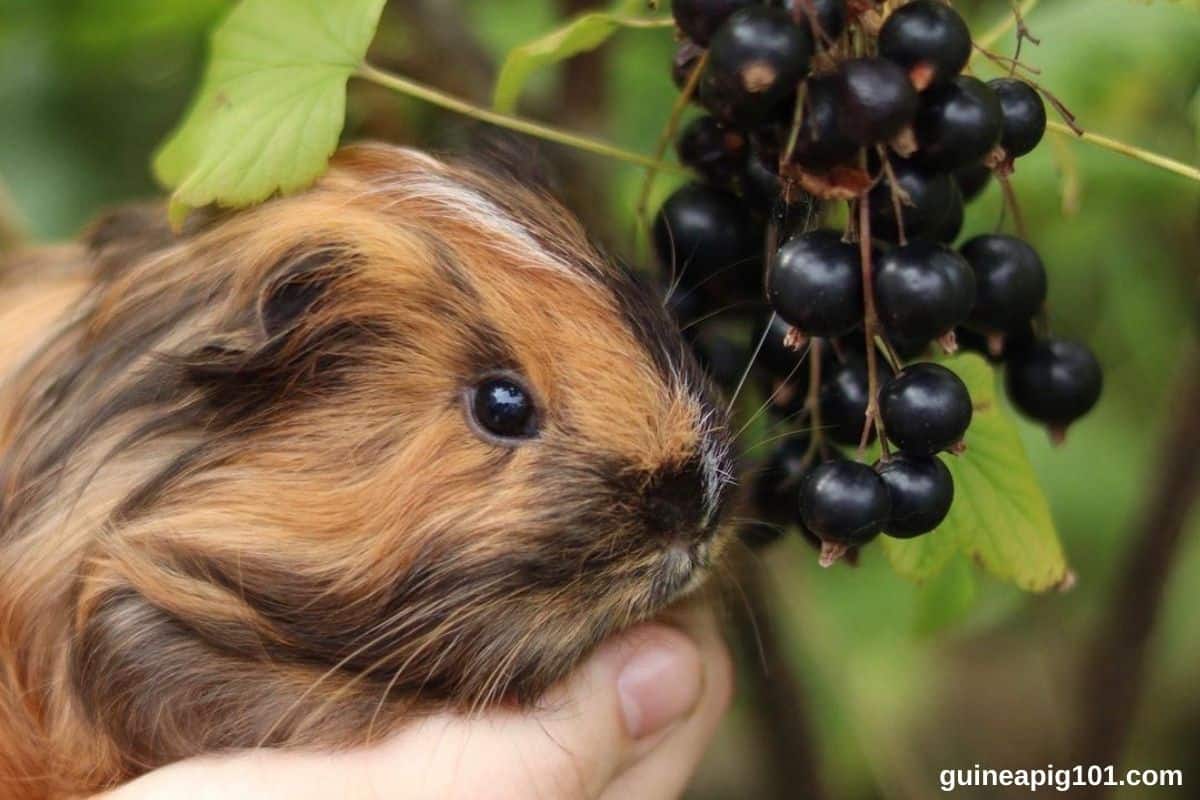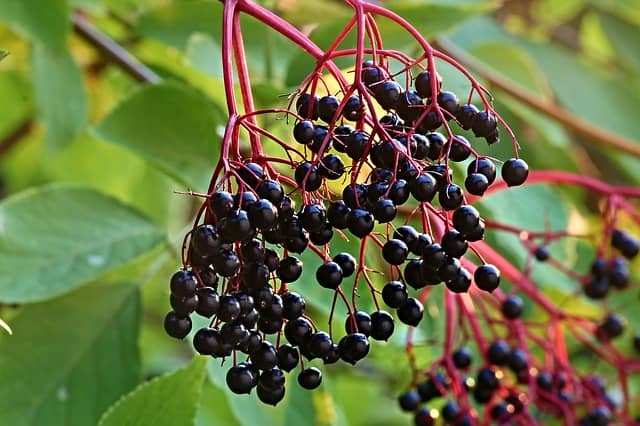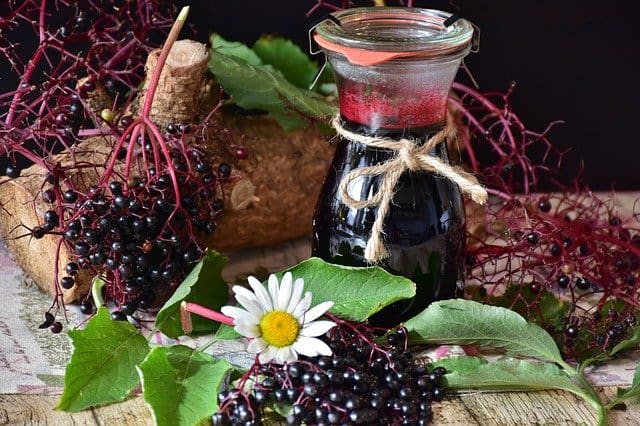Elderberries are an excellent source of Vitamin C and sugar, which makes it equally beneficial and harmful. Guinea pigs need a balanced diet with Hay, vegetables, and fruits to live a healthy life. So, it is evident that a guinea pig owner can wonder if their guinea pigs can eat elderberries or not.
As a curious guinea pig owner, I did some research, and here is what I have learned.
Guinea pigs can eat elderberry along with their skin and seed. However, make sure you avoid its stems, leaves, juice, or jam as these are terrible for our guinea pigs. Elderberry contains a moderate amount of sugar in it. So, serve it sparsely to avoid health issues.
Elderberries are species of Sambucus family. It is mostly grown for its leaves, plants, and fruits.
Guinea pigs can eat elderberries, and they are pretty good for them.
But what if guinea pigs are allergic or what if they don’t like elderberries? We got all your questions answered, just keep reading.
Are guinea pigs allergic to Elderberries?
No, guinea pigs are not allergic to elderberries.
Even though feeding them, elderberries regularly can harm them because of the phosphorus, calcium, sugar, and pantothenic acid present in it.
We have already made you aware of the fact that they are not allergic; let’s have a look at other hazards of elderberries.
Do guinea pigs like Elderberries?
Although guinea pigs are not allergic to elderberries, chances are not every guinea pig will enjoy it.
Some may despise them. But that depends upon your guinea pig’s choices.
You will have to keep an eye on them to know about their preferences and likeness.
Is Elderberry Toxic To Guinea Pigs?
Elderberries are common plants with various health benefits. Elderberries are also edible and quite healthy for our guinea pigs.
They are not poisonous for our cavy. However, it contains cyanogenic glycosides.
These cyanogenic glycosides release cyanide when it enters a body. Each part of the plant includes a different level of toxicity.
Excess intake of elderberries can cause some significant problems to our guinea pigs such as:
- Digestion problems: Elderberries contain a high amount of phosphorus and sugar level, which can cause some severe health issues including diarrhea and other gastrointestinal problems.
- Toxicity: An elderberry contains cyanogenic glycosides that release cyanide when it is ingested. However, it will not harm our guinea pigs if it’s served in moderation.
- Urinary infections: Calcium present in this fruit can be useful to our guinea pigs for building bones and structures. But for grownups, they can be fatal. Excess calcium can cause urinary stones, pain during urination or blood in urine, and infections in the urinary tract. That can be inevitable, leading to kidney failures.
- Weight gaining: All the carbohydrates can help our guinea pigs to gain weight if fed regularly. Gaining weight can make them lazy and slow their metabolism.
So, it is better to serve elderberries to our guinea pigs in moderation. But how do we identify elderberries?
How to Identify Elderberries?

Elderberries are a common plant that can be found anywhere or everywhere. They can grow on roadside, hedgerows, and scrubs.
It can be found all around the globe, including Europe, North Africa, and West Asia.
The two most common varieties found in the US are black elderberry and the American black elderberry.
We should know about every part of the fruit to have a clear view. Here are the toxic elements of the elderberry:
- Plant: These are shrub-like plant structures, compound leaves, and having beautiful clusters of white flowers. It spreads about 8-12 feet across and is about 5 to 12 feet tall.
- Branches: In the starting phase, they have green stems. But as the plant grows older, the stems convert itself into the bark. The bark has small bumps, and bigger stems have vertical lines.
- Leaves: The leaves are arranged in opposite pairs. These leaves are pinnate with 5 to 9 leaflets. They are in dark green, with sharp edges.
It fruits in the month of August-September, we will have the most beautiful fruits grown in clusters.
These are purple or dark blue, and they measure 3-5 mm in diameter. This fruit is rich in flavonoids and especially anthocyanins. These are the only edible part of the plant.
Health Benefits of feeding elderberry to guinea pigs?
We have already taken a look at the consequences of eating elderberries regularly. Now look at the health benefits it includes for our guinea pig:
- Prevents various illnesses: Elderberries are a great source of Vitamin C that boosts their immune system and makes them more energetic.
- Sadly, guinea pigs cannot produce Vitamin C on their own.
- Elderberries can be an excellent help for guinea pigs regarding Vitamin C.
- Cures blood deficiency: There is a slight amount of iron present in it, which helps smooth blood flow. Increases level of hemoglobin in our guinea pigs. And also, it prevents blood clots and makes our guinea pigs healthier.
- Vitamin-rich: Elderberries are rich in vitamins and minerals such as Vitamin A, Vitamin C, calcium, B-complex vitamins. These all help our guinea pigs if fed moderately.
We have finally concluded all the pros and cons of serving them elderberries. Now, let’s have a look at the quantity that should be offered to our guinea pig.
How many Elderberries can guinea pigs eat at a time?
Elderberries are suitable for our guinea pigs but only when it is given in moderation.
You can feed 5 to 6 elderberries with their other healthy food. It will be more beneficial if we serve them elderberries with a healthy bowl of vegetables containing bell pepper, cilantro, lettuce, etc.
Elderberries are good for our guinea pig, but I’m afraid we cannot serve them daily as it contains a decent amount of sugar and other minerals, making it quite risky for them if fed daily.
How often can guinea pigs Elderberries?

We should serve elderberries to our guinea pigs 1-2 times a week.
For example, if we have helped them elderberries on Sunday, we should skip 2-3 days and feed it on Wednesday.
We cannot risk feeding this fruit regularly to our guinea pigs because of cyanogenic glycosides, which turn in cyanide when ingested too much.
However, we should feed this fruit occasionally because it is a good source of Vitamin C and other vitamins and minerals.
Can baby guinea pig eat elderberry?
There are no data from experts, particularly for baby guinea pigs. But as we can see, elderberries have a hint of calcium, fat, Vitamin C, etc. We recommend feeding baby guinea pigs a small number of elderberries.
Calcium will help them to build strong bones and grow fast. Vitamin C will improve their immune system and fasten their metabolism.
However, elderberries being little acidic and fatty needs to be kept in mind to avoid health issues like diarrhea
You can feed a small berry once a week to begin with. If they don’t show any signs of diarrhea or other health issues you can feed it a little more frequently.
Is Elderberry Fruit Harmful To Guinea Pigs?

Elderberries are toxic for our guinea pig if fed in excess, but it doesn’t mean it will do severe harm to our guinea pig.
If fed in moderation, it is safe and pretty good for them.
There’s a saying ‘excess of everything is terrible,’ which defines itself pretty much.
However, everybody responds differently to different things. Some are sensitive, while some are unresponsive.
The same goes for guinea pigs as well. You need to watch out for signs of health issues if you are feeding it for the first time.
However, with that said elderberry is not toxic to our guinea pig if fed moderately.
When to Call Your Vet?
If you sense some changed behavior in your guinea pig and think this might be because of excess elderberries, you should immediately call your vet.
Chances are they have eaten a lot of elderberries, causing cyanide poisoning. We should act fast because cyanide is a fast-acting toxin that can quickly start the deterioration of organs.
If you notice any of these symptoms, you need to work immediately.
- Change in behavior
- Heavy breathing
- Lost appetite
- Change in urination and defecation
- Physical changes, such as loss of hair, skin redness, etc.
When Can Elderberries Be Eaten by Guinea Pigs?
Guinea pigs should be fed only ripe elderberries.
Wash them thoroughly, getting rid of dirt and unwanted chemicals.
Three features of elderberries that show if it’s ripe or not is:
- It should be plump & juicy.
- Elderberries should be slightly soft to the touch.
- And, completely darkened purplish or dark blue.
Not every elderberry is poisonous when it’s unripe. But talking on the safe side, it is better to serve ripe elderberries to our guinea pig.
Can guinea pigs eat elderberries leaves?
Elderberry leaves are poisonous, and it’s better to avoid feeding guinea pigs leaves as they don’t have any remarkable nutritional value.
We should not feed any food to our guinea pig, which doesn’t hold any nutritional benefit for them.
So, it’s better if we do not serve them elderberry leaves.
Can guinea pigs eat elderberries seeds?
Usually, Guinea pigs should not be fed any seeds as seeds can be a choking hazard for them.
However, elderberries have a tiny seed and there’s no evidence regarding it choking our guinea pigs.
So, with that in mind, you can feed elderberries to your guinea pigs without removing seeds from it.
Can guinea pigs eat elderberries with skin?
Yes, elderberries can be served with its skin. Elderberry is a fruit that can be eaten whole.
Their coats are purple and blue, giving it a sweet and sour taste. It is rich in Vitamin C, making it excellent for our guinea pigs.
But it should be fed in moderation to our guinea pig as it contains tiny traces of cyanide. But other than that, it is perfect for them.
Can guinea pigs eat elderberries jam?
Guinea pigs should not be fed elderberries jam as it contains sugar, cinnamon, cloves, etc.
These ingredients are added to make jam tastier. But it can harm our guinea pigs severely. Ingredients like cinnamon or cloves can damage their digestive system.
We understand your fondness for elderberry jam, it not only attracts us with its bright purplish color, but it also tastes fantastic.
And we honestly want our guinea pigs to have a taste. But to keep our guinea pigs healthy and happy, it is important not to serve any such food.
Can guinea pigs eat elderberry jelly?
No, guinea pigs cannot eat elderberry jelly.
Just like elderberry jam, it contains sugar and butter.
It is fattening for them, and the added sugar can increase their sugar level that leads to diabetes and weight gain. Thus, avoid it altogether.
Can guinea pigs eat canned elderberries?
Canned elderberries are elderberries that are preserved in cans using preservatives, sugar, and different chemicals. Guinea pigs should not be fed anything like this.
It is recommended not to feed guinea pigs canned elderberries because it can harm them in many ways, starting with digestion problems, obesity, and more inevitable issues.
They should always be served fresh vegetables and fruits. We can’t compromise with our guinea pig’s health.
Can guinea pigs eat frozen elderberries?
Frozen elderberries or any frozen food should not be fed to our guinea pigs until and unless it is thawed and brought to the room temperature.
Also, serving them, frozen food can lead to diarrhea and bloating. Frozen items can be too cold and hard for them to chew. Remember to bring your fruit to room temperature before serving them to your guinea pigs.
Can guinea pigs eat dried elderberries?
No guinea pigs cannot eat dried elderberries. Dried food usually contains an excess amount of sugar in it.
Serving it can lead to several health issues including diarrhea and obesity.
Can guinea pigs drink elderberry juice?

Guinea pigs cannot drink elderberry juice. Guinea pigs cannot digest high sugar, preservatives, and other ingredients for making juice tastier.
These ingredients can harm our guinea pig, causing several health issues. It can be fattening for our guinea pig. And sugar imbalance can cause a severe health problem as well.
How to prepare elderberries for guinea pigs?
We don’t need to do something special to prepare elderberries for our guinea pigs. It is really simple and straightforward:
- Get rid of every dirt and unwanted chemicals present in elderberries by washing it thoroughly.
- Choose the best elderberries which are soft, plump, and ripe so that it does not get hard for them.
- We don’t need to peel off its skin as elderberries can be eaten whole.
- The quantity should be limited; only 5-6 pieces of elderberries will be sufficient for them.
- Serve elderberries with a healthy bowl. Mix it with other veggies.
- Always remove leftovers from the cage as it attracts flies and rats.
Conclusion: Guinea pigs and elderberries
Guinea pigs need a lot of attention when it comes to their diet. Elderberries are pretty good for them but only when fed in moderation.
Elderberries contain Vitamin C, which guinea pigs cannot produce. It is rich in vitamins and minerals, which boosts metabolism; it also has iron in the right amount, which prevents iron deficiency.
However, it is essential to choose the right berries. Elderberries should be plump, soft, and dark blue or purple.
We should only feed them ripe berries. We should feed them every 2-3 days and only 5-6 pieces.
To balance the amount of sugar and various other minerals. Elderberry contains cyanogenic glycosides, which turn into cyanide when ingested, so it is essential to limit it.
But elderberries are not toxic even though it can have its side effects if fed without limit.
We can serve our elderberries with their skin and seeds as this fruit is entirely edible.
Elderberries are a beautiful fruit with its bright color and sweet taste. It is almost impossible to neglect them. But it is essential to have them in a limited amount.
Related questions
Can guinea pigs eat cranberries?
Yes, guinea pigs can eat cranberries. Chances are they will love it. But we should feed them only in small quantities, like 2-3 cranberries at a time.
Cranberries should be fresh, correctly washed, and raw. They are rich vitamins and minerals like Vitamin A and Vitamin C.
It helps them to build a robust immune system and metabolism. It also helps in preventing urinary tract infections.
But don’t feed them excesses. Like any other fruit, it is high in sugar and calories. If fed limitlessly, it can increase their sugar level and make them fat.
Can guinea pigs eat gooseberries?
Yes, but gooseberries should be fed only once a week and in small amounts. It contains Vitamin C, which is suitable for guinea pigs.
It helps in building the immune system. Although gooseberries also contain calcium, phosphorus, a hint of fat, and are quite acidic.
If fed limitlessly, it can cause calcium stones, causing obesity or acids to do some inevitable damage. So please don’t forget to serve them in limited quantities. And enjoy feeding them gooseberries.
Sources: Everything you need to know about Elderberries, Nutrition in Elderberries, Diet Composition and Mineral Balance in Guinea Pigs, Dietary Vitamin C, and Vitamin E on Guinea Pig Immune Responses to Mitogens, Vitamin C requirements of the guinea-pig, Is Your Guinea Pig’s Diet Providing the Right Nutrients? Care of Guinea Pigs.
Similar Posts:
- What Fruits Can Guinea Pigs Eat? (Fruit List, Serving Size & More)
- Can Guinea Pigs Eat Mulberries? (Hazards, Serving Size & More)
- Can Guinea Pigs Eat Lychee? (Hazards, Serving Size & More)
- Can Guinea Pigs Eat Passion Fruit? (Hazards, Serving Size & More)
- Can Guinea Pigs Eat Dragon Fruit? (Hazards, Serving Size & More)